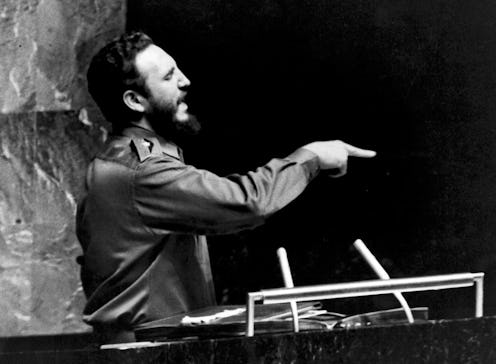News
This Fidel Castro Quote Is So Powerful
On Nov. 25, former leader of Cuba Fidel Castro died at the age of 90. Fidel Castro took control of Cuba in 1959, at the height of the Cold War, when he led Cuba's communist revolution and overthrew the then-dictator Fulgencio Batista. During his tenure, distrust between the United States and Cuba grew, with John F. Kennedy attempting to overthrow Castro's communist regime during the failed Bay of Pigs invasion. Tension between the two countries reached a high point when Castro allowed the Soviet Union to build missile launching sites in Cuba, which culminated in the 1962 Cuban Missile Crisis, a 13-day period when many believed the world was on the brink of nuclear war.
But although his politics were controversial, the New York Times says, "For good or ill, Mr. Castro is without a doubt the most important leader to emerge from Latin America since the wars of independence of the early 19th century, not only reshaping Cuban society but providing inspiration for leftists across Latin America and in other parts of the world." Indeed, even after stepping down as Cuba's leader, Castro wrote in his letter to the nation announcing his resignation, "I am not saying goodbye to you, I only wish to fight as a soldier of ideas."
During his tenure, Castro did indeed prove himself to be a soldier of ideas, with one of his most famous — and possibly most poetic — quotes dealing with the concept of revolutions, spoken in a speech given on the second anniversary of the Cuban Revolution:
A revolution is not a bed of roses, a revolution is a struggle to the death between the future and the past.
This quote is striking for a few reasons. For one, even though the language is poetic — it ends with a nice antithesis, contrasting the future and the past, for example — the meaning is anything but. Without explicitly saying it, Castro is basically saying that revolutions are, by nature, bloody and violent — "not a bed of roses" is a huge understatement. But at the same time, he is couching the reality of what revolutions entail in flowery language, and in a way, obscuring the violence and suffering by wrapping them up in a nice literary bow.
The concept of revolutions being "a struggle to the death between the future and the past" is also thought-provoking. I think the most interesting component is Castro's word choice — characterizing the struggle as one between the future and the past, rather than between the future and the present. But, coming from the perspective of a revolutionary leader, it makes sense that, to him, the current political system would be seen as "the past," as antiquated.
Though the cause of death is not yet known, there were indications that his health had been declining in recent years. In July 2006, Fidel Castro temporarily handed power over to his younger brother, Raul, after an acute colon infection. Less than two years later, in February 2008, he stepped down as president of Cuba and completed the transfer of power to Raúl. Even in declining health, Castro still promoted and fought for his ideas. In April 2016, in one of his last public appearances before his death, he said, "Our turn comes to us all, but the ideas of Cuban communism will endure."
